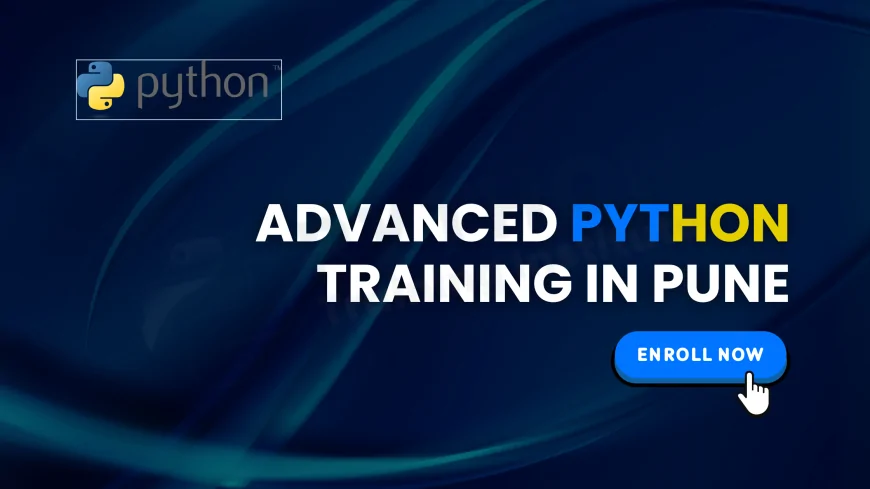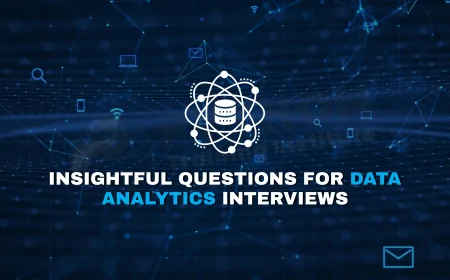What Is Covered in Advanced Python Training | Complete Guide for Learners in Pune
Discover what is covered in advanced Python training at top institutes in Pune. Learn about key topics, real-world projects, career benefits, and why this course is essential for your growth in web development, data science, and automation.

Python has firmly established itself as one of the most powerful and versatile programming languages of the modern era. While its intuitive syntax and beginner-friendly nature attract many newcomers, the language also has a deep and highly sophisticated side — one that supports high-performance applications, automation, scientific computing, artificial intelligence, and complex software systems.
This depth is what advanced Python training explores. Far beyond basic syntax and loops, advanced training opens up topics that truly elevate you from a script writer to a software architect, systems designer, or automation expert.
In this guide, we’ll take a comprehensive look at what is typically covered in advanced Python training, why these topics matter, and how they are used in real-world applications.
Advanced Python Training
Advanced Python training is designed for programmers who already understand core Python concepts such as data types, control flow, functions, classes, and basic file handling. These courses dive into the language internals, performance tuning, asynchronous programming, and advanced libraries that enable large-scale application development, automation, and data processing.
The purpose of such training is not just to write more complex code — it’s to write cleaner, faster, more scalable, and maintainable Python code with a deeper understanding of the language.
1. Python Internals and Execution Model
One of the first topics typically covered is how Python works under the hood. This includes the execution model, bytecode, and memory management.
Topics include:
-
How Python compiles to bytecode
-
Python memory model: stack vs heap
-
Reference counting and garbage collection
-
The Global Interpreter Lock (GIL) and its implications
-
Differences between Python interpreters (CPython, PyPy, Jython)
Why it matters:
Understanding Python’s execution flow helps you write optimized and bug-resistant code, particularly when dealing with performance or memory-intensive applications.
2. Object-Oriented Programming (OOP) at an Expert Level
Most developers learn the basics of OOP — classes, inheritance, and encapsulation. Advanced training, however, dives deeper into custom class behavior and metaprogramming.
Topics include:
-
Abstract Base Classes (ABCs)
-
Multiple inheritance and Method Resolution Order (MRO)
-
Property decorators and computed attributes
-
Overriding special methods (
__getitem__,__setattr__,__str__, etc.) -
Class decorators and metaclasses
Why it matters:
Advanced OOP allows developers to build extensible, modular frameworks and tools with clean abstraction layers and reusable components.
3. Functional Programming in Python
Python supports functional programming constructs that, when used appropriately, can lead to highly expressive and elegant code.
Topics include:
-
Lambda functions,
map(),filter(), andreduce() -
Closures and higher-order functions
-
Decorators and function composition
-
Immutable data structures
-
Generators and coroutines
-
Recursion and tail-call optimization
Why it matters:
Functional programming promotes a declarative coding style, ideal for data transformations, pipelines, and reducing side effects in code.
4. Iterators, Generators, and the Iterator Protocol
Deep mastery of custom iterators and generator expressions allows developers to process large datasets efficiently and lazily — one item at a time, without loading everything into memory.
Topics include:
-
Creating custom iterable classes
-
Using
yieldandyield from -
Generator expressions vs list comprehensions
-
Implementing
__iter__()and__next__() -
Generator-based coroutines
Why it matters:
Generators are crucial in real-time data processing, web crawling, and stream-based programming.
5. Concurrency and Parallelism
One of the most vital advanced topics is Python’s ability to run multiple tasks simultaneously or in parallel — a necessity for modern applications.
Topics include:
-
Threading vs multiprocessing
-
The
threading,multiprocessing, andconcurrent.futuresmodules -
Asynchronous programming using
async/await -
Event loops and
asyncio -
Synchronization primitives: locks, semaphores, and queues
Why it matters:
Concurrency enables applications to perform I/O-bound and CPU-bound tasks efficiently without blocking user interaction or system responsiveness.
6. Advanced Data Structures and Algorithms
While Python’s built-in data types are sufficient for basic applications, more complex scenarios benefit from custom and advanced data structures.
Topics include:
-
Custom linked lists, stacks, and queues
-
Binary trees, heaps, and tries
-
Graph algorithms with adjacency lists and matrices
-
Memoization and dynamic programming in Python
-
Efficient sorting/searching using
bisect,heapq, andcollections
Why it matters:
Mastery of data structures is essential for algorithm design, database operations, and real-time system architecture.
7. Memory Optimization and Performance Tuning
Professional-grade applications require speed and efficient memory usage. Python provides various tools for profiling and optimizing code.
Topics include:
-
Using
timeit,cProfile,line_profiler, andmemory_profiler -
Algorithmic complexity (Big-O) in Python contexts
-
Built-in tools like
sys.getsizeof() -
Avoiding memory leaks and reference cycles
-
Writing C extensions with
ctypesorCythonfor performance-critical code
Why it matters:
Optimization is the difference between code that works and code that scales. Performance tuning is key in high-load environments.
8. Pythonic Design and Best Practices
Advanced training often includes writing idiomatic Python — code that leverages the language’s strengths and avoids common anti-patterns.
Topics include:
-
List/dict/set comprehensions vs loops
-
The Zen of Python and code readability principles
-
Pythonic error handling with
try/except/else/finally -
Using context managers and
withstatements -
EAFP vs LBYL: different coding philosophies
Why it matters:
Writing Python the “Pythonic” way leads to more readable, maintainable, and elegant code that other developers can easily work with.
9. Packaging, Modules, and Application Structure
For developers aiming to distribute their code, it’s crucial to understand how to package Python applications correctly.
Topics include:
-
Creating and structuring Python packages
-
Writing
__init__.pyfiles and using relative imports -
Managing dependencies with
pip,venv, andpyproject.toml -
Creating distributable modules with
setuptoolsandwheel -
Versioning, documentation, and changelog best practices
Why it matters:
Proper packaging is vital for professional software development, open-source contributions, and internal code reuse in organizations.
10. Type Hints and Static Typing
While Python is dynamically typed, modern best practices encourage using type hints to improve code clarity, tooling, and debugging.
Topics include:
-
Adding type annotations to functions, classes, and modules
-
Using
typingmodule:List,Dict,Tuple,Optional,Union,Any -
Type-checking with tools like
mypy,pyright, andpylance -
Advanced typing: Generics, Callable, NewType
-
Type-safe development with IDE support
Why it matters:
Type hints enhance code maintainability and catch bugs early, especially in large or team-based projects.
11. Testing and Test Automation
Automated testing is an essential part of robust software development, and advanced training includes test-driven practices.
Topics include:
-
Unit testing with
unittestandpytest -
Writing testable code using dependency injection
-
Mocking and patching with
unittest.mock -
Behavior-driven development (BDD) principles
-
Continuous Integration and automated test pipelines
Why it matters:
Testing ensures code quality and prevents regressions during updates, especially in production environments.
12. Security and Best Practices
Advanced courses introduce secure coding techniques, especially when handling user input, files, and network interactions.
Topics include:
-
Safe file handling and input validation
-
Avoiding injection vulnerabilities
-
Cryptographic modules for encryption/decryption
-
Managing secrets and configuration
-
Secure HTTP requests and SSL
Why it matters:
Security is non-negotiable in professional software. Knowing what to avoid is just as important as knowing what to do.
13. Working with APIs and Web Services
In modern applications, interaction with external systems via APIs is common.
Topics include:
-
Making HTTP requests with
requestsandhttp.client -
Consuming REST and GraphQL APIs
-
Parsing JSON and XML data
-
Rate limiting and error retries
-
Creating lightweight REST APIs with micro-frameworks
Why it matters:
API consumption and interaction are critical for automation, integration, and cloud-based development.
14. Logging, Monitoring, and Debugging
Large applications require visibility into runtime behavior, which is achieved through structured logging and monitoring.
Topics include:
-
Using the built-in
loggingmodule effectively -
Logging configuration files and handlers
-
Writing custom log formatters and filters
-
Debugging with
pdb, IDE breakpoints, and stack trace analysis -
Using log aggregators and performance dashboards
Why it matters:
Logging and debugging tools reduce downtime and improve maintainability in real-world applications.
FAQ's
1. What topics are included in an advanced Python training course in Pune?
Advanced Python training at a reputed Python Training Institute in Pune covers OOPs, multithreading, decorators, generators, file handling, database integration, and frameworks like Django and Flask. It focuses on writing production-level code, which enhances career opportunities in software development and automation.
2. Does advanced Python training include real-world projects?
Yes, top Python Training Institutes in Pune offer hands-on real-world projects in areas like web development, data analysis, and automation. These projects help learners build a job-ready portfolio and improve their practical skills for IT roles.
3. Is data structures and algorithms part of advanced Python training?
Absolutely. Advanced Python courses include in-depth coverage of data structures (like lists, sets, stacks, queues) and algorithms to enhance problem-solving. This is crucial for cracking technical interviews and building efficient applications.
4. Will I learn web development in advanced Python courses?
Yes, web development using Django and Flask is a key module. Python Training Institutes in Pune focus on building dynamic web apps, APIs, and deploying them, boosting your web developer career potential.
5. Are machine learning or AI basics taught in advanced Python training?
Many advanced Python courses in Pune introduce basics of machine learning using libraries like NumPy, Pandas, and Scikit-learn. It sets the foundation for AI roles and expands career scope in data science domains.
6. Do Python training institutes in Pune cover testing and debugging techniques?
Yes, debugging, error handling, and unit testing with PyTest or unittest are core parts of advanced training. These skills are crucial for developing reliable applications and ensuring code quality in professional environments.
7. What are the prerequisites for advanced Python training in Pune?
Learners should have basic knowledge of Python syntax, variables, loops, and functions. Familiarity with basic programming concepts ensures better understanding of advanced topics and a smoother learning experience.
8. How does advanced Python help in career growth?
Advanced Python skills open doors to high-paying roles in web development, data analytics, machine learning, and automation. Institutes in Pune design courses to align with industry demands, helping learners stand out in the job market.
9. Will I get placement support after completing advanced Python training?
Many Python Training Institutes in Pune offer placement assistance, resume building, and interview preparation. Completing an advanced course boosts your chances of securing roles in top MNCs and tech startups.
10. Does the course include multithreading and multiprocessing?
Yes, concurrency with multithreading and multiprocessing is taught to help learners build efficient, high-performance applications. These topics are valuable for backend and system-level programming jobs.
11. Are design patterns covered in advanced Python training?
Yes, common design patterns such as Singleton, Factory, and Observer are introduced. Understanding these helps in building scalable and maintainable applications, especially for experienced developers aiming for senior roles.
12. Will I learn database connectivity using Python?
Advanced courses include MySQL and SQLite integration using libraries like sqlite3 and SQLAlchemy. These skills are essential for backend developers and data analysts working with structured data.
13. Is GUI development part of the curriculum?
Yes, some institutes in Pune cover GUI development using Tkinter or PyQt. It equips learners with the ability to create user-friendly desktop applications for various business needs.
14. How does advanced Python training help with freelance opportunities?
With advanced skills in Django, Flask, APIs, and automation, you can take freelance projects globally. Training institutes in Pune provide the technical depth and project experience needed to work independently.
15. Will I be taught REST API development in Python?
Yes, RESTful API development using Flask or Django REST Framework is part of most advanced Python programs. It prepares learners for backend development and full-stack roles in the software industry.
16. Is version control like Git included in advanced training?
Absolutely. Git and GitHub are integrated into the curriculum to help learners manage code, collaborate in teams, and prepare for real-world development environments.
17. Do institutes in Pune provide certification after course completion?
Yes, Python Training Institutes in Pune provide recognized certificates upon course completion. These certifications validate your skills and strengthen your resume for competitive job applications.
18. How long does it take to complete an advanced Python course?
Typically, advanced Python training lasts 6 to 8 weeks, depending on the institute and learning mode. Weekend and fast-track options are also available in Pune to suit working professionals.
19. Are assignments and coding challenges part of the training?
Yes, practical assignments, coding tasks, and quizzes are regularly included. These enhance understanding and prepare students for technical interviews and real-world coding scenarios.
20. Is cloud integration like AWS taught in advanced Python training?
Some Python courses in Pune include cloud integration basics, especially using AWS services like Lambda and S3 with Python. These are valuable for developers working on scalable, cloud-based applications.
Key Takeaways
Advanced Python training is not simply an academic exercise — it is a professional necessity for developers who want to build reliable, scalable, and high-performing software. From mastering the internals of the language to learning how to architect real-world systems, such training transforms you from a proficient coder into a Python expert.
Whether you're working in automation, data engineering, backend development, or system design, the advanced topics covered here form the core skill set that sets expert developers apart.
Understanding what’s inside an advanced Python curriculum helps you plan your learning journey more strategically. And as Python continues to evolve, so too must your expertise — with the depth and discipline of an advanced developer.
What's Your Reaction?
 Like
0
Like
0
 Dislike
0
Dislike
0
 Love
0
Love
0
 Funny
0
Funny
0
 Angry
0
Angry
0
 Sad
0
Sad
0
 Wow
0
Wow
0












